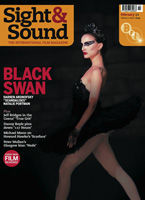Peter Mullan: Glasgow belongs to me
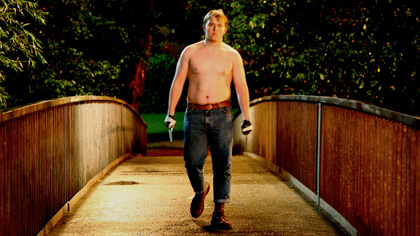
Peter Mullan is already well known as one of Britain’s most intense screen actors. But with Neds he cements his reputation as a director whose commitment to emotional truth transcends social realism. By Demetrios Matheou
Peter Mullan recalls reading a newspaper report about the murder of an eight-year-old boy in Edinburgh: “This boy and his friend had watched a fight in the street involving two older boys. They knew nothing about it. After the fight, the victor chased after these two kids, just because they had been cheering for the other lad. And when he caught up with them, he beat one of them to death with a brick.”
One might imagine that this is a story out of today’s newspapers, at a time when street gangs and rising knife crime are a major concern (one recent report suggested that as many as 50,000 British teenagers are involved in gangs). In fact it was a cutting – presumably a yellowed one – from 1893. “When I read it I was really shocked, because the story was so familiar,” says Mullan. “But this act of seemingly random violence, where a child lost his life, was well over a hundred years ago.
“So for me, today, you can’t just blame society,” he continues. “This problem is a massive, complex cocktail that stretches back to the beginnings of time. In England and Scotland you can date it to the industrial revolution, when you start seeing groups of young lads creating these weird territorial divides, only defined amongst themselves, with no particular financial gain to be had. It’s about disaffected youth, having fuck all to do, not knowing who you are. It’s aligning yourself with your peers – and you can only do that if you have another set of peers to align yourself against. You find your little grouping and you go, ‘OK, what are we going to do? We’ll take on that group, and that group. Let battle commence.’”
Insights such as this inform Neds, the Glaswegian’s third feature as a director, steering the story of a 15-year-old’s destructive dabbling with a gang of ‘Non-Educated Delinquents’ away from the stale sub-genre of contemporary British films about teen violence and hooliganism – which are so often little more than exploitation dressed as ‘rites of passage’ – towards something more thoughtful and resonant.
Set in the early 1970s, it follows the fortunes of John McGill, an intelligent working-class boy who looks set to transcend his impoverished background and escape the violent tendencies of both his father and elder brother. But his community doesn’t make it easy: at school he’s demoted to an inferior stream, merely because of his brother’s reputation; later, during a fateful summer break, his crass, class-informed rejection by the mother of a well-to-do friend propels John into the welcoming bosom of a local gang, the Young Car-Ds. Before long, the mild-mannered newcomer has become the gang’s resident monster.
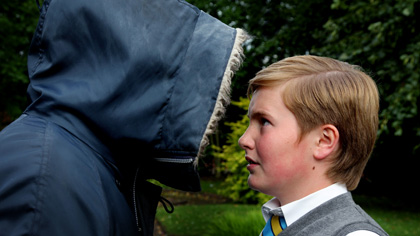
Gregg Forrest (right) as the young John McGill
Initially Mullan intended to look at the issues involved in gang culture. “I wanted to look at the nature of tribalism, education, the role of family, the church,” he explains. “But as I was writing, I realised it was less about issues and more experiential. This is about adolescence. This isn’t about gang, tribe, family, church – they’re there, but it’s really about the travails of youth and what happens between prepubescent and post-pubescent worlds.
“Of course, it would have to be set in an area of industrial decline,” he continues, “but bringing no great mention of that industrial decline. I made a conscious effort to not look into these people’s work lives, the employment issues of the time, the political culture. To really evoke adolescence, you have to be true to it, and when you’re in the middle of that experience you don’t give a monkey’s fuck what’s happening in the rest of the world. You care about your haircut, about how you’re dressed, about who you’re meeting tonight, if you’re going to get off with somebody. It’s purely hedonistic and narcissistic. I didn’t want to be a middle-aged man forcing my view of the world upon this group of kids.”
Realism and fantasy
It’s now eight years since Mullan’s last feature as director, The Magdalene Sisters. His powerful indictment of the Catholic church’s incarceration and abuse of women in Ireland won the Golden Lion in Venice, while overcoming the obstructions of a very vexed Vatican to achieve awards and sterling box office worldwide.
That film’s success consolidated the reputation of Britain’s most accomplished actor-director, a man whose work either side of the camera is characterised by its integrity and blistering authenticity. His first film Orphans, a visually vibrant, emotionally torrid tragicomedy about a Glasgow family, also won prizes in Venice back in 1998 – the same year Mullan picked up the best actor award in Cannes for his terrific turn as a recovering alcoholic in Ken Loach’s My Name Is Joe.
At that point, the ‘overnight sensation’ had already been working for some years: first in Scotland’s political theatre, then – following a supporting role in Loach’s Riff-Raff (1991) – in small parts in such significant Scotland-based films such as Shallow Grave (1994), Braveheart (1995) and Trainspotting (1995). At the same time he’d also been directing some terrific short films: Close (1994), Good Day for the Bad Guys (1995) and the award-winning Fridge (1995) – films that portrayed Glasgow working-class life with a combination of gritty realism, gallows humour and fantasy that anticipated the style of his feature work.
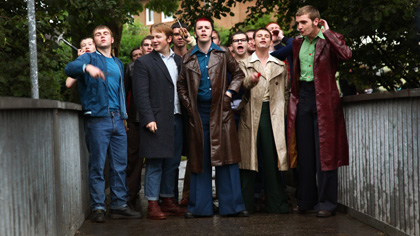
Mullan – who’s speaking to me now from behind the giant white beard he’s grown for his role in Steven Spielberg’s film of the hit WWI play War Horse – never gives less than his all in his acting assignments. In Michael Winterbottom’s The Claim (2000), for instance, he was so focused on his snowbound death scene that he slipped into hypothermia without anyone realising. But one senses that his greater interest lies behind the camera. So why has there been such a long delay since The Magdalene Sisters?
“I got offered lorry-loads of scripts after Magdalene, from the States,” he recalls. ”And the challenge of working there would have been good, particularly after the American success of Magdalene, which helps your confidence no end. But nothing took my fancy. Nothing. I remember Peter Weir’s statement, that unless you can relate a script to your soul, don’t do it. It’s not enough to think ‘clever idea’, because you’ve got to live with it for so long. In the meantime I was earning a living as an actor. Finally about four years ago I thought, ‘I need to sit down and write something myself.’”
Within a year of finishing his script for Neds, he was turning the camera. “We were dead lucky,” he admits. “The UK Film Council – who then existed – ring-fenced some money for us. Then Scottish Screen did the same. We got private funding from France. It was done really quickly. Then I just had to work out how we could shoot this film for the budget, £3.5 million, which was problematic. But had we tried to get the money six months later, we would never have managed it. We got it just before the banks collapsed.”
Fact and fiction
Watching Neds, one can’t help but draw parallels with what we know of Mullan’s own life. Like John McGill, he came from a poor family, and his father was a violent alcoholic; he himself was a member of the Young Car-Ds and – despite being a bright, bookwormy boy – played truant from school for the entire year of his gang career. And yet the director has pointedly diverted such comparisons in his own statement about the film being “personal, but not autobiographical”. So where does he draw the line?
“If you were going to do an autobiographical piece, you would have to remain completely faithful to at least your own version of the truth,” he says. “Whereas this is easily 90 per cent fiction, albeit very much influenced by things I saw, heard about and experienced. There were tiny bits of pressure, way back – people saying it would sound better if it’s ‘a true story’. But it’s not a true story, so it felt more honest to say so, in advance.”
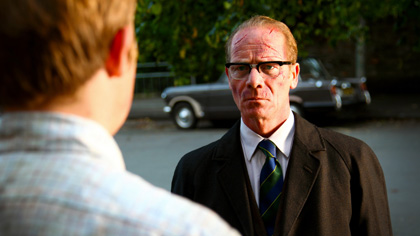
Peter Mullan (right) as John’s father in Neds
The border between fact and fiction is at its most intriguing in Mullan’s own performance as the boy’s father, who fits the description he once gave me of his own father: “one of those people who come into a room with the smell of death, and suck the life out of it”. He says that he and his brother Lenny, who cast the film, decided early on that he would be ‘plan B’ for the father. Only when they failed to secure their desired actors, and money started to get tight, did Mullan take the role – for the princely sum of £400.
“At that point, Lenny was a bit concerned that it could fuck me around mentally,” he recalls. “I had no such worries, because I knew it was just a character – it was not my dad – and playing him was ridiculously easy. Funnily enough, if I’m honest, every word that he says in the film is verbatim from my own experience. My father did say those things, and do those things. But it was not a case of working out issues with my dad, but presenting that kind of behaviour as starkly as I could.”
He describes his performance, with some relish, as “borderline over the top”. This was in keeping with his instruction to his adult cast, which includes his My Name Is Joe co-stars Gary Lewis, Louise Goodall and David McKay. “I wanted the kids to be very much rooted in the real world. To differentiate between grown-up and child, I wanted a slightly older-fashioned acting style, more akin to 70s acting, less obsessed with distilled naturalism. So I told the adult actors not to be afraid to go towards Please Sir!, or a bit Play for Today – not to be afraid to float a couple of inches above reality and” – he laughs – “just out of range of being hammered by the critics.”
This attitude typifies a directorial style that is not as close as one might assume to the social realism of, say, Loach and Alan Clarke; indeed, that’s a tendency Mullan consciously resists. While Conor McCarron, who plays the older John, reminds one of Ray Winstone in Clarke’s Scum (1979), comparisons with that film fade in the light of John’s Jesus fantasies and his epiphanic encounter with a pride of lions.
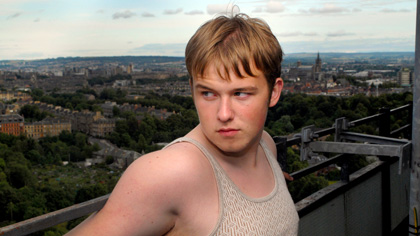
Conor McCarron as the teenage John McGill
“I get bored with naturalism and social realism – unless it’s beautifully served to me, in the case of somebody like Ken Loach,” Mullan confesses. “I get restless with it. If one has an imagination, one should use it – in my book. Towards the end of the story I thought, ‘Let’s let go of any form of social realism. Let’s go more towards Greek tragedy and – fuck it – pantomime.’ The rest of the film is all well and good – low-key, understated, social this, social that. Personally, when it goes off into never-never land, I find it far more exciting.”
The flamboyance of the film’s final reel coincides with Mullan’s decision to move beyond his initial ending (when John is allowed back to school), in the process confounding our conditioned assumption about the boy’s redemption.
“I couldn’t offer John redemption, because there is none,” he says – as if that’s no bad thing, redemption being a solution too easily offered up by fiction. “There is a journey out of this, but it’s not as easy as John being allowed back to school,” he says. “If I had finished the film then, it would have been more akin to some of Alan Clarke’s work, which is very much about people being fucked over by society. No offence, I adore his work – but for me that’s too simplistic.”
Mullan is particularly frustrated by the 18 certificate given to Neds by the BBFC, because the audience he’s really aiming for is the same age as his protagonist. “I’m under no illusions,” he says. “They are not going to sit there and go, ‘You know what, chaps, I say we get rid of the fucking blades and go back to making carrot cake?’ But if any kid sees what John ends up doing in Neds, I would love to think he will say, ‘I don’t wanna do that. That’s where I draw the line.’ And that’s when I will have achieved something.”
‘Neds’ is released on 21 January, and is reviewed in the February issue of Sight & Sound
See also
Off the rails: Nick Bradshaw on Neds screening at the London Film Festival (October 2010)
4.3.2.1. reviewed by Lisa Mullen (July 2010)
Better Things reviewed by Jonathan Romney (February 2009)
New boots and rants: Jon Savage on Shane Meadows’ This is England (May 2007)
The Wind That Shakes the Barley reviewed by Edward Lawrenson (July 2006)
Young Adam reviewed by Philip Kemp (October 2003)
Welcome to my nightmare: Tim Roth talks to Shane Danielsen about filming his The War Zone (August 1999)
Orphans reviewed by Edward Lawrenson (May 1999)
Wilful amateur: Mike Figgis talks to Geoffrey Macnab about his Miss Julie and The Loss of Sexual Innocence (May 1999)
Ordinary Decent Criminal reviewed by Geoffrey Macnab (April 2000)
Ratcatcher reviewed by Charlotte O’Sullivan (November 1999)
